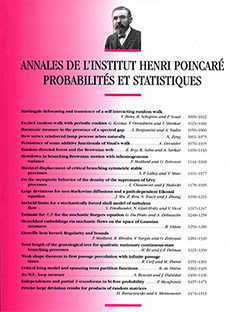Abstract
In testing that a given distribution P belongs to a parameterized family $\mathcal{P}$, one is often led to compare a nonparametric estimate An of some functional A of P with an element Aθn corresponding to an estimate θn of θ. In many cases, the asymptotic distribution of goodness-of-fit statistics derived from the process n1/2(An−Aθn) depends on the unknown distribution P. It is shown here that if the sequences An and θn of estimators are regular in some sense, a parametric bootstrap approach yields valid approximations for the P-values of the tests. In other words if An* and θn* are analogs of An and θn computed from a sample from Pθn, the empirical processes n1/2(An−Aθn) and n1/2(An*−Aθn*) then converge jointly in distribution to independent copies of the same limit. This result is used to establish the validity of the parametric bootstrap method when testing the goodness-of-fit of families of multivariate distributions and copulas. Two types of tests are considered: certain procedures compare the empirical version of a distribution function or copula and its parametric estimation under the null hypothesis; others measure the distance between a parametric and a nonparametric estimation of the distribution associated with the classical probability integral transform. The validity of a two-level bootstrap is also proved in cases where the parametric estimate cannot be computed easily. The methodology is illustrated using a new goodness-of-fit test statistic for copulas based on a Cramér–von Mises functional of the empirical copula process.
Pour tester qu’une loi P donnée provient d’une famille paramétrique $\mathcal{P}$, on est souvent amené à comparer une estimation non paramétrique An d’une fonctionnelle A de P à un élément Aθn correspondant à une estimation θn de θ. Dans bien des cas, la loi asymptotique de statistiques de tests bâties à partir du processus n1/2(An−Aθn) dépend de la loi inconnue P. On montre ici que si les suites An et θn d’estimateurs sont régulières dans un sens précis, le recours au rééchantillonnage paramétrique conduit à des approximations valides des seuils des tests. Autrement dit si An* et θn* sont des analogues de An et θn déduits d’un échantillon de loi Pθn, les processus empiriques n1/2(An−Aθn) et n1/2(An*−Aθn*) convergent alors conjointement en loi vers des copies indépendantes de la même limite. Ce résultat est employé pour valider l’approche par rééchantillonnage paramétrique dans le cadre de tests d’adéquation pour des familles de lois et de copules multivariées. Deux types de tests sont envisagés : les uns comparent la version empirique d’une loi ou d’une copule et son estimation paramétrique sous l’hypothèse nulle ; les autres mesurent la distance entre les estimations paramétrique et non paramétrique de la loi associée à la transformation intégrale de probabilité classique. La validité du rééchantillonnage à deux degrés est aussi démontrée dans les cas où l’estimation paramétrique est difficile à calculer. La méthodologie est illustrée au moyen d’un nouveau test d’adéquation de copules fondé sur une fonctionnelle de Cramér–von Mises du processus de copule empirique.
Citation
Christian Genest. Bruno Rémillard. "Validity of the parametric bootstrap for goodness-of-fit testing in semiparametric models." Ann. Inst. H. Poincaré Probab. Statist. 44 (6) 1096 - 1127, December 2008. https://doi.org/10.1214/07-AIHP148
Information





